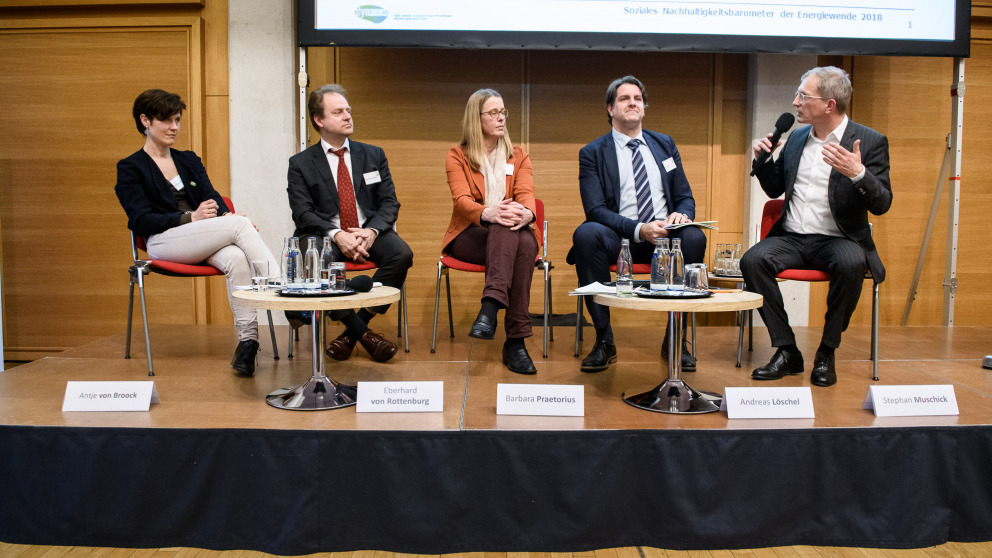“The Social Sustainability Barometer for the German Energiewende Fills a Gap”
22.02.2019
The second edition of the Social Sustainability Barometer for the German Energiewende offers insights into public opinion on this important issue. Following a presentation by social scientist and author Daniela Setton of the Institute for Advanced Sustainability Studies (IASS), a panel of experts highlighted some of the key findings.

Following a presentation by social scientist Daniela Setton of the Institute for Advanced Sustainability Studies (IASS) on the key findings of the study, a panel of experts discussed the latest edition of the Social Sustainability Barometer for the German Energiewende. Around 7,000 members of the public were surveyed for the study. Antje von Broock, Deputy Executive Director at Friends of the Earth Germany (BUND), praised the sophisticated approach adopted for the survey and the nuanced picture that it paints. She regrets that policymakers do not take enough note of surveys of this kind and added “... we need surveys like this because they give us an idea of the questions that we should be asking. Now in its second iteration, the Social Sustainability Barometer produced by the IASS offers us a glimpse of emerging trends”, said von Broock. “I would urge anyone whose work contributes to the energy transition to study the barometer closely!”
According to Eberhard von Rottenburg of the Federation of German Industries (BDI), the Social Sustainability Barometer fills a gap. “And the strength of public support for the energy transition is reassuring”, said the representative of the Federation of German Industries (BDI). The fact that a democratic majority could be found for a decision with such far-reaching consequences makes Germany a role model. In light of the global nature of the climate challenge, von Rottenburg sees a role for Germany as a supplier of sustainable technological solutions to other countries. He also warned against the hasty imposition of regulations that would ban combustion engines and recommended that efforts to offer alternatives be intensified.
On the one hand a change of energy is desired, on the other hand nobody wants to adapt his lifestyle
At the same time, von Rottenburg was concerned at the “public’s rather schizophrenic outlook”; with some citizens bemoaning the slow pace of the energy transition, while others cleave to fossil fuel vehicles – the public, he suggested, is saying “Wash me, but don’t make me wet”. In other words, public support for the energy transition in Germany is not translating into a willingness to embrace lifestyle changes.
The IASS study sheds light on the public’s critical view of the energy transition, said Professor Barbara Prateorius, the Chair of the so-called ‘Coal Commission’. “However, I was surprised to learn that public support for the energy transition almost matches that for the nuclear phase-out,” said Prateorius, who teaches at HTW University of Applied Sciences in Berlin. She suggested that more should be done to take citizens’ concerns into consideration during the development of energy transition projects. “We need to provide more opportunities for participation and bring tenants into the process more than has previously been the case”, she argued. Prateorius went on to note that while the energy transition has its detractors, a high percentage of citizens back the transformation of the energy system and policymakers should build on this foundation.
Professor Andreas Löschel, Chair of the “Energy of the Future” Expert Commission of the German Government, also highlighted the ambivalence revealed by the survey: “For some citizens, the energy transition cannot proceed fast enough; others, meanwhile, advocate a slower pace in order to deliver a fairer transition,” he said. According to Löschel, the challenge lies in the trade-off between intensifying climate protection efforts and maintaining price stability.
Further informations (in german):
